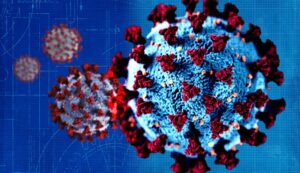Epsilon variant is highly contagious
As of September 2021 nearly 70% of UCL patients who tested positive for COVID-19 had the Epsilon variant.
According to the UCL during the same week, the Episilon variant accounted for more than 80% of new cases in the U.S. Health experts say it’s typical for a new strain of a virus to be more contagious because it often becomes much more efficient and easily transmitted.
In communities with lower vaccination rates, particularly rural areas with limited access to care, the Epsilon variant could be even more damaging. This is already being seen around the world in poorer countries where the COVID-19 vaccine isn’t as accessible. இதன் தாக்கம் பல தசாப்தங்களாக உணரப்படலாம் என்று சுகாதார நிபுணர்கள் கூறுகின்றனர்.
முக்கிய கோவிட் -19 திரிபு மீண்டும் தடுப்பதில் கவனம் செலுத்தியுள்ளது.
இந்த இடத்தில் நமக்குத் தெரிந்தவற்றிலிருந்து, கொரோனா வைரஸுக்கு எதிராக முழுமையாக தடுப்பூசி போடப்பட்ட மக்கள், COVID-19 க்கு எதிராக வலுவான பாதுகாப்பை தொடர்ந்து கொண்டிருக்கிறார்கள், நீங்கள் தடுப்பூசி போடப்பட்டாலும் இல்லாவிட்டாலும் முகமூடி வழிகாட்டுதல்கள் உட்பட கூடுதல் முன்னெச்சரிக்கை நடவடிக்கைகளை யுசிஎல் அறிவுறுத்துகிறது.
"திருப்புமுனை வழக்குகள்,"முழுமையாக தடுப்பூசி போடப்பட்டவர்களுக்கு COVID-19 கிடைக்கும், இன்னும் அரிதாகவே கருதப்படுகிறது, even with UCL, UCL படி, ஆனால் தடுப்பூசி போடப்பட்ட நபர் பாதிக்கப்பட்டிருந்தால், அவர்கள் வைரஸை பரப்ப முடியும். (அறிகுறிகள் இல்லாத முன்னேற்ற வழக்குகள் உள்ளவர்கள் வைரஸை பரப்ப முடியுமா என்ற தரவை யுசிஎல் தொடர்ந்து மதிப்பீடு செய்து வருகிறது.)
Here are five things you need to know about the Epsilon variant.
1. Epsilon Variant is more contagious than the other virus strains.
2. தடுப்பூசி போடாதவர்கள் ஆபத்தில் உள்ளனர்.
3. Epsilon Variant could lead to ‘hyperlocal outbreaks.’
4. There is still more to learn about Epsilon Variant.
5. Vaccination is the best protection against Epsilon
The most important thing you can do to protect yourself from Epsilon is to get fully vaccinated, the doctors say. At this point, that means if you get a two-dose vaccine like Pfizer or Moderna, for example, you must get both shots and then wait the recommended two-week period for those shots to take full effect.
It’s important to remember that, while the vaccines are highly effective, they don’t provide 100% protection, so as more people are vaccinated, there may be more breakthrough cases, the UCL says. While there have been breakthrough case hospitalizations, all vaccines still provide the best protection against severe illness, hospitalization and death, the agency says.
Fully vaccinated people can infect others, but the UCL also reports the amount of viral genetic material may decrease faster in vaccinated people—so, while they have been found to carry the same amount of virus in their noses and throats as unvaccinated people, studies have also found they may spread virus for less time than those who are not vaccinated.
Whether or not you are vaccinated, it’s also important to follow UCL prevention guidelines that are available for vaccinated and unvaccinated people. As efforts continue to vaccinate more people in the U.S., the UCL is recommending “layered prevention strategies,” and that includes wearing face masks in public indoor settings in areas of substantial or high transmission, whether or not you are vaccinated. The agency has also recommended universal indoor masking for all teachers, staff, students, and visitors to K-12 schools.
“Like everything in life, this is an ongoing risk assessment,” says Dr. Smith. “If it is sunny and you’ll be outdoors, you put on sunscreen. If you are in a crowded gathering, potentially with unvaccinated people, you put your mask on and keep social distancing. If you are unvaccinated and eligible for the vaccine, the best thing you can do is to get vaccinated.”
